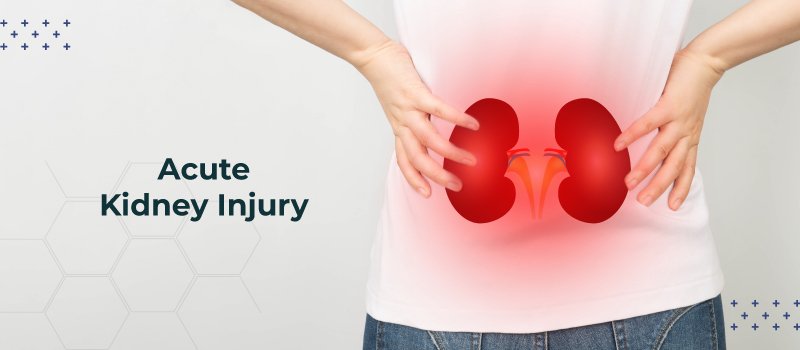Acute Kidney Injury

What is Acute Kidney Injury?
Symptoms of Acute Kidney Injury
AKI may not show symptoms initially, but common signs include:
Reduced urine output or no urine output
Swelling in legs, ankles, or around eyes due to fluid retention
Shortness of breath
Fatigue and weakness
Confusion or drowsiness
Nausea and vomiting
Chest pain or pressure (in severe cases)
Irregular heartbeat due to electrolyte imbalance
Causes and Types of AKI
AKI is classified based on its cause:
Prerenal AKI – Due to decreased blood flow to the kidneys, such as from dehydration, blood loss, heart failure, or low blood pressure.
Intrinsic AKI – Due to direct damage to the kidney tissue, like glomerulonephritis, acute tubular necrosis (from toxins or prolonged ischemia), infections, or drug-induced nephrotoxicity.
Postrenal AKI – Due to blockage in the urinary tract preventing urine outflow, such as kidney stones, enlarged prostate, or tumors.
Diagnosis and Procedures for AKI
Diagnosis involves:
Blood tests (creatinine, urea, electrolytes)
Urine tests (urinalysis, urine output monitoring)
Ultrasound or CT scan to check for obstruction or kidney size
Kidney biopsy in selected cases to identify underlying disease
Treatment Options for AKI
Treatment depends on the cause and severity:
Addressing underlying causes (hydration for dehydration, stopping nephrotoxic drugs, treating infections)
Fluid and electrolyte management to correct imbalances
Medications to manage blood pressure or treat infections
Temporary dialysis if kidneys fail to filter toxins adequately or if life-threatening electrolyte imbalances occur
Supportive care for overall health and recovery
Early detection and treatment are crucial to prevent permanent kidney damage.
Benefits of Early Treatment
Prevents progression to chronic kidney disease
Reduces the need for dialysis
Lowers risk of complications like heart problems and infections
Supports faster recovery and return to normal kidney function
Improves overall health outcomes and quality of life
Prevention of Acute Kidney Injury
Stay well-hydrated, especially during illness, exercise, or hot weather
Monitor and control blood pressure and blood sugar levels
Avoid overuse of painkillers (NSAIDs) and nephrotoxic drugs
Prompt treatment of infections and urinary tract obstructions
Regular kidney function tests if you have risk factors like diabetes, heart disease, or chronic kidney disease
